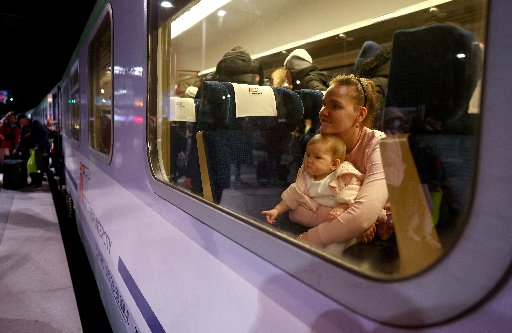At stations and borders, Ukrainians are threatened by human trafficking
BERLIN — Catholic leaders are warning that the exodus of Ukrainian women and children presents a prime opportunity for human trafficking, and they are taking action to protect refugees.
Even Pope Francis hinted at the situation in a tweet: “Let us think of those women and children who, over time, without work, separated from their husbands, will be sought after by the “vultures” of society. Please let us protect them.
In Germany, police have been warning for weeks that aid workers, volunteers and refugees should be vigilant in areas where refugees arrive.
At Munich’s main train station, hundreds of Ukrainian refugees mingle daily with aid workers, volunteers and ordinary citizens who welcome them. According to several reports, among these “helpers” are an increasing number of men who want to force women into prostitution.
“Here at the main station, a lot is going on – there is a 24-hour specialist advice center,” Bettina Spahn, head of mission at the Catholic station in Munich, told ARD TV. “We are on site 24 hours a day; Caritas is there 24 hours a day. It is publicly stated in multilingual leaflets that women should be careful. The police are on the spot. This is not a mass phenomenon, but we have already seen isolated cases of attempted human trafficking and could help prevent it. I am convinced that we have this problem under control here, but it exists.
“You have to counter that early on,” Spahn said. She and her Protestant counterpart are in charge of the ecumenical reception center for refugees at the station.
At a mid-March press conference in the Archdiocese of Munich and Freising, Gabriele Stark-Angermeier, board member of the Catholic charity Caritas, said: “There is definitely an attempt to approach these women with their children”. The purpose of these men, she says, is to force women into prostitution. She sees it as “a systematic narrative” and underlines: “The problem exists”.
At the Berlin station, mostly older men were seen holding up signs with offers of accommodation and overnight stays for women, just like genuine helpers. Aid workers and the police are suspicious when men only show their signs to certain women and, in certain circumstances, also offer money.
A police spokesman said that during the first two weeks of March, the police banned some men from entering the station premises, but as no crime had been committed, they could not no longer act.
A pinned March 8 tweet by the German Federal Police – written in German, Russian and Ukrainian – warned unaccompanied women and young people to beware of “suspicious accommodation offers – only contact official agencies”.
“We are aware of the danger of trafficking and our staff are being kept up to date on the current situation,” Thomas Gleissner of Caritas Berlin told Catholic News Service March 22. “We screen our volunteers as much as possible but, due to the situation, we cannot ask for certificates of good conduct from the police, as we normally do when volunteers work with minors and vulnerable people. But we pay a lot of attention to it, and in our refugee shelter, the staff on site are also aware of the dangers of human trafficking.
As of March 21, around 10,000 refugees were arriving in Berlin every day, and city officials expect that number to double soon, since the city is only 80 km from the Polish border.
Caritas is setting up a center in Berlin where Ukrainian refugees can receive help and advice.
On March 15, Valiant Richey, Special Representative and Coordinator for the Fight against Human Trafficking of the Organization for Security and Cooperation in Europe, brought together representatives of 17 European countries affected by the humanitarian crisis.
The governments of Austria, France, Germany, Romania and Slovakia said some of the measures they had in place were monitoring online searches after a spike was noted in searches for Ukrainian women. for sex and marriage. They also distributed leaflets translated into Ukrainian to inform people on the move of their rights and options.
The warnings seem to reach the refugees, who are then sometimes wary of the innocent.
Crazy Tours, a Bavarian bus company, sent buses to the Polish-Ukrainian border to transport the refugees to Nuremberg, where accommodation had been arranged by the city council. But the company reported that many Ukrainian women refused to board their buses.
“Rumors are circulating that buses are coming and then dumping refugees in the middle of nowhere or putting them into prostitution,” owner Marco Eichhorn wrote on Facebook. He said only 56 of the 164 seats were filled on return.
A journalist from RTL TV posed as a Ukrainian refugee looking for an apartment on eBay Inc. A man then contacted her to say that he would like to share a bed with her and quickly sent her messages. explicit photos. He arranged to meet the alleged Ukrainian woman at Berlin’s main train station, where the undercover reporter confronted him. He denied all actions.
Contacted by the TV channel, eBay said it is currently checking offers with the keywords “neighborhood assistance” and “Ukraine” particularly intensively and, if necessary, blocking user accounts.


Comments are closed.